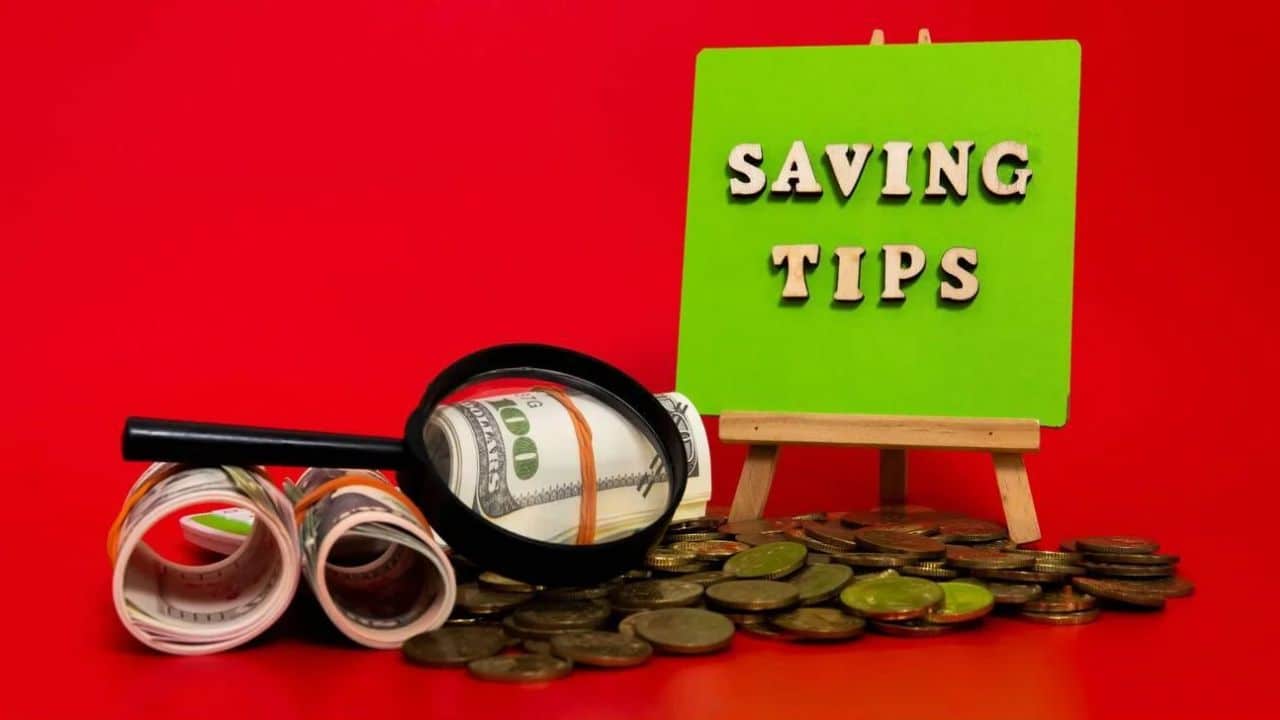Is making your money stretch feeling like a never-ending battle? You’re not alone. Many of us are trying to get by on a tight budget, looking for ways to save without sacrificing too much of what we love.
It’s all about finding the right tricks and tools to help keep more cash in our pockets.
Bankrate is here to lend a hand. With their guidance and smart tools—think financial calculators and comparison services—you won’t be shooting in the dark. They’ve teamed up with big names like American Express, Bank of America, and Discover, ensuring you get top-notch advice without bias.
This article will share 25 top tips for saving money—from slashing grocery bills with meal prep to ditching hefty cell phone plans—that can really change the game for you financially.
Are you ready to turn things around? Keep reading!
Content Highlights
- Putting money in a high-yield savings account helps it grow faster. This means you get free cash for being smart about where to keep your money.
- Cutting down on small automatic purchases, like unused gym memberships or streaming services, can save a lot of money. Checking bank statements helps find these costs.
- Cooking big meals at home and using leftovers saves money on food and cuts waste. Meal planning around sales makes grocery shopping cheaper.
- Fixing things instead of buying new ones not only saves money but also reduces waste. Simple repair skills extend the life of household items.
- Finding forgotten or unclaimed cash through websites like Unclaimed.org can give an unexpected boost to your budget without much effort.
1. Mastering the Art of Strategic Purchasing
Moving from the basics, getting good at smart buying can really stretch a dollar. It’s like having a secret weapon for saving money. First off, putting savings directly into an account that grows your money faster is brilliant.
Think about it; your cash isn’t just sitting there—it’s working for you. And who doesn’t want their money to work harder?
Next up, spending before taxes can save a ton of cash. This move lets you buy what you need or invest in things like retirement plans without paying tax on that money first. Also, don’t forget to shop around for insurance costs—car, health, you name it! Finding lower rates means more dollars stay right in your pocket, where they belong.
2. Utilizing Free Resources and Services
So, you’re on a tight budget. Great news! Loads of free stuff out there can help save you dollars. Who wouldn’t want their savings to grow at 4.60% without doing much? It’s all about looking in the right places and asking around.
Now, here’s something cool for seniors or anyone eager to learn more—going back to school might not cost a dime. Across all 50 states, opportunities exist for older adults to hit the books again without breaking the bank.
Imagine adding new skills or knowledge at no cost; it’s possible and proves that age really is just a number when it comes to education.
Libraries are gold mines for free resources too. Not just books – but movies, workshops, internet access, and sometimes even tools or baking pans! And don’t forget online platforms offering courses from top universities worldwide for zero fees.
Learning new skills or brushing up on hobbies doesn’t have to empty your wallet.
3. Overcoming Credit Card Debt
After learning how to use free stuff, let’s tackle credit card bills. Credit cards can be tricky. They make it easy to spend money we don’t have. Then, interest rates pile up, and paying off becomes harder.
A good plan is to use the debt snowball method. This means you pay off the smallest debts first while keeping up with minimum payments on others. It feels great to clear some debts quickly!
Another smart move is asking for lower interest rates from your card company or looking into debt consolidation plans. Sometimes, they will help if you explain your situation. Also, consider cash-back options when possible to save a bit here and there as you spend wisely with intention- every little bit helps reduce what you owe over time!
4. Making Interest Rates Work in Your Favor
Just tackled that credit card debt? Great! Now, let’s switch gears to interest rates. They might seem boring, but they can be your best friends if you know how to work them. Start by directing some of your paycheck straight into a high-yield savings account.
Why? Because these accounts pay you more for keeping your money there. It’s like getting free cash just for being smart about where you park your money.
Also, have you thought about checking accounts that earn interest? Yep, they exist! Banks offer these special accounts that give you a little extra every time money sits in your account.
This way, every dollar in your checking account works harder for you without lifting a finger. So, move some cash into an account that grows over time and watch as those small additions pile up into something big.
Trust me; it feels awesome to see your money grow while handling everyday expenses with the same bank cards.
5. Reducing Student Loan Payments
Paying off student loans can feel like a huge mountain to climb. But, good news! There are ways to make this mountain a bit easier to hike. One smart move is looking into refinancing options.
This means you find a new agreement with better terms for your loan. Think lower interest rates and maybe even smaller monthly bills. Sounds pretty great, right? Some companies specialize in this, so doing a little research could end up saving you big.
Another trick is signing up for an income-driven repayment plan if you qualify. Your payments change based on how much money you make. Make less money? Pay less each month. It’s as fair as it sounds and can really ease the burden when times are tight.
Lastly, don’t forget about programs that forgive part of your loan if you work in certain jobs or after making payments for many years—especially for those working in public service or education.
Yes, sticking with one job or plan does require patience and dedication but imagine having a chunk of your debt just … vanish! Keep these tips in mind and tackling those student loans might get a whole lot easier.
6. Effective Meal Prepping
So, you’ve just tackled how to reduce student loan payments. Next up is figuring out how to save a good chunk of change through effective meal prep. Trust me, it’s easier than it sounds and way kinder on your wallet.
- First things first, jot down your favorite simple dishes. Think about meals that are easy to cook in big batches. Chili, stew, and pasta sauces are your best friends here.
- Grab those grocery store ads from the mail—let’s hunt for deals! Plan your meals around what’s on sale that week. Chicken at a discount? Time for some chicken stir-fry action.
- Make a grocery list and stick to it like glue when shopping. This helps avoid those sneaky extra snacks or items you really don’t need jumping into your cart.
- It’s time to embrace those leftovers! Cook once, eat twice, or thrice. With a little creativity, last night’s grilled chicken can become today’s salad topping or tomorrow’s sandwich filler.
- Get friendly with your freezer. Freeze portions for later dates; this will make sure you always have something homemade and healthy within reach.
- Let’s talk tools. Investing in some good-quality containers is key for keeping your food fresh longer.
- Spending time on Sundays prepping can save tons of time during the week. Chop veggies, marinate meats, and maybe cook a big batch of grains like rice or quinoa.
Now, while money-saving is a huge perk of meal prepping, don’t forget the cherry on top: This method also cuts down on food waste big time since you’re only buying what you plan to use. Plus, it nudges you towards healthier eating since you’re controlling exactly what goes into your meals—no hidden additives or sneaky sugars here!
7. Switching Banks for Cash Incentives
Lots of banks offer cash if you start banking with them. It’s like they’re saying, “Hey, come over here! We’ll give you money!” This is a smart way to save some extra cash. Just make sure to read all the details so you know what you need to do to get that bonus.
Often, it means setting up direct deposit or keeping a certain amount in your account. Doing this can put more money in your pocket without much work.
Next up, let’s talk about making the most of those tax refunds.
8. Strategic Handling of Tax Refunds
Getting a tax refund feels like winning a small lottery, right? It’s actually your money coming back to you. Most folks get excited and spend it right away. A smarter move is to think of that refund as a part of your budget.
You could put it into savings or use it to pay off debts. Imagine slashing your credit card balance with one swift move. Or, even better, tucking that cash into a retirement fund for future.
What if we use that refund in an even smarter way? Consider investing some of it. Maybe in stocks or bonds. Investing might seem scary, but it’s another way to make your money grow over time.
And let’s not forget about emergency funds – life loves throwing surprises our way, and having cash set aside can be a lifesaver.
Also, ever thought about learning something new with that money? Taking a course or buying books can boost your skills and maybe help you earn more down the line. Sometimes spending wisely means spending on yourself—in smart ways!
9. Avoiding False “Deals”
Stores often shout about big sales that make you think you’re saving a ton of money. Really, they sometimes mark up prices before the sale. So, you’re not getting the deal you thought.
It’s smart to keep an eye on things you want to buy and see how their prices change. You might notice patterns or find a better time to buy.
Another trick is those “buy one get one” offers. They can be tempting but ask yourself if you really need two of something? Also, cash back apps or websites can help turn actual purchases into savings down the road, but only if buying things you truly need.
10. Canceling Non-Necessary Automated Purchases
Cutting down on costs is tough but clever. One smart move? Stop buying stuff you don’t really need without thinking. Here’s how to tackle those sneaky automatic buys that drain your wallet.
- Look at your bank statements: Your first step is getting a clear view of what’s going out of your account each month. You might find some surprises, like that magazine you never read anymore.
- Say goodbye to gym memberships if you’re not going: It feels good to think we’re staying healthy, but if the only exercise you get is walking past the gym, it’s time to cancel.
- Streaming services can trap you: Keep the ones you love and actually watch. The rest? Time for them to go. We often sign up for free trials and forget them. They add up!
- Subscription boxes are fun but often unnecessary: That monthly box of snacks or makeup might bring joy, but if items just pile up, they’re probably not worth it.
- Check apps on your phone for hidden subscriptions: Sometimes, we subscribe inside apps and totally forget about them. Dive into your phone settings and check for any subscriptions lurking there.
- Audit any service that auto-renews: This could include web hosting or cloud storage services that quietly renew every year without much notice.
- Utility contracts can sneak up on you: Got cable TV just for that one show you watched two years ago? Maybe it’s time to rethink that plan.
- Regularly review memberships in clubs or organizations: These can be enriching, but if you’re not active, consider leaving them behind.
- Think twice about automatic renewals for things like antivirus software: You might get it cheaper elsewhere or find out you don’t need such a hefty package after all.
- Automated charity donations are noble but reconsider them in tough times: Continue supporting causes close to your heart when possible, but maybe adjust the amounts as needed.
- Reevaluate meal kit deliveries frequently: They save time but look closely if they save money too — sometimes, grocery shopping is cheaper.
This list prompts us all to ask one vital question—am I really using this enough to justify the cost? Often, we find several places where cutting back isn’t just smarter; it’s essential for keeping our finances healthy and happy.
11. Identifying Hidden Energy Expenses
Have you ever looked at your utility bill and wondered why it’s so high? You’re not alone. Many of us miss the hidden energy costs that add up over time. Think about a pantry challenge – yes, like the one where you use up everything before buying more food.
Doing this can shine a light on how much energy we waste without thinking. For example, that old fridge in the garage packed with extra drinks is gobbling electricity day and night.
Another sneaky spot for savings is your closet. Building a capsule wardrobe, which means having fewer but versatile clothes, does more than just simplify your life; it cuts down on laundry loads too! Imagine washing clothes only once a week instead of three times.
That saves water, detergent, and most importantly, electricity from running the washer and dryer so often.
And here’s a thought – walk around your house at night. See all those little lights on chargers, TVs not in use but still plugged in? They’re eating up power too! Unplugging these “energy vampires” might seem small but adds up to big savings over months or even weeks.
It’s all about paying attention to those tiny details – because when we do, finding ways to trim our bills becomes almost…fun? Well, maybe not fun exactly but definitely satisfying!
12. Repairing Instead of Replacing
Fixing stuff instead of buying new ones saves cash and cuts down on trash. Think about it – that leaky faucet or creaky chair might not need a trip to the store, just a little love and some basic do-it-yourself skills.
Grabbing a screwdriver, some glue, or maybe watching a quick how-to video online can go a long way. This way, you keep more money in your pocket and give those items around your house a second chance.
Learning simple repair tricks for common household things is like unlocking a superpower. You’d be surprised what you can fix with just thread and needle or some strong adhesive. Plus, diving into repairs means you waste less – good news for our planet! So next time something breaks, take a moment before you toss it out.
A quick fix might be all it needs, teaching you something cool in the process!
13. Saving on Prescription Medications
Saving money on prescription medicines is easier than you think. You just need to know where to look and what to ask.
- Start by chatting with your doctor. They might know about cheaper alternatives that work just as well.
- Look into generic drugs instead of brand – name ones. Generics cost less and are just as effective.
- Use a drugstore’s discount program. Many stores offer savings on meds if you sign up.
- Check out big retailers like Walmart or Target. They often have lower prices on prescriptions.
- Explore online pharmacies for deals, but make sure they’re legit.
- Ask your pharmacy if they match prices from other places.
- Look into programs that help people pay for medicines, such as Medicaid.
- Consider mail – order options, especially for meds you take regularly.
- Use apps or websites that compare drug prices in your area to find the best deal.
- Keep an eye out for coupons from drug makers or discounts cards online.
- If you’re buying several meds, see if bundling them at one place saves money.
- Some health insurance plans have preferred pharmacies that offer lower costs; find out if yours does.
These steps can make a big difference in how much you spend on meds each month without compromising on health care quality or safety!
14. Ditching Expensive Cell Phone Plans
Paying too much for your cell phone plan can eat up a big part of your budget. Look at what you’re really using. Do you need all that data? Maybe not. Many find they don’t use as much internet or minutes as they thought.
This is where discount mobile services come in handy. They offer plans that give just what you need, without the extra cost. And switching is easier than you think.
Companies like Chime and prepaid options are great places to start looking for cheaper plans. They often have deals that match your actual usage, saving you money each month. Plus, getting rid of those huge bills frees up cash for other things in your life.
Next up, let’s talk about how finding lost cash can give your savings a nice boost…
15. Reclaiming Forgotten Money
So, you think all your money is right where it should be? Well, there might be some of it hiding in places you forgot to look. We’re talking about cash that somehow slipped through the cracks.
It could be from an old bank account you closed or a refund check that never made its way to your mailbox. States hold onto this kind of money until someone claims it. Finding it is easier than you might guess.
Start by checking out websites like Unclaimed.org or MissingMoney.com. Just type in your name and see if anything pops up. You’d be surprised how many people find they’ve got a little (or sometimes a lot) waiting for them! And hey, claiming this money is usually free and straightforward—just follow the steps they give you.
Now let’s talk about making the most of what your job offers…
16. Maximizing Employer Benefits
Just found some money you forgot about? Great! Now, let’s talk about not leaving any money on the table at work. Your job offers more than just a paycheck. Think retirement plans and health savings accounts (HSAs).
Yes, putting money into these might seem like it’s cutting into your cash now, but in the long run? Big win.
First off, make sure you’re putting enough into your employer-sponsored retirement plan to get their full match. It’s like free money for your future self. And don’t overlook those HSAs either.
If your job matches contributions there too, it’s another chance to save without feeling the pinch right away. Plus, both of these are smart moves tax-wise. So while it might feel tight month-to-month, think of this as smoothing out your road ahead—more cushion for later with less worry about bumps along the way.
17. Handling Raises Wisely
Getting a raise is exciting. You might think about all the things you can now buy. But, stop for a second! A smart move is to act like you didn’t get that extra money. Yes, really.
Put it straight into your savings account, especially one that earns interest over time. This way, your future self will thank you.
Think about this – if your employer matches retirement contributions, upping what you put in can make a big difference. It’s like getting free money just for thinking ahead about your golden years.
Also, paying off any loans faster is a great use of that raise. Less debt means more freedom down the line.
Next up: why cheaper travel doesn’t mean less fun…
18. Traveling Economically
Traveling doesn’t have to empty your wallet. You can still explore new places on a tight budget.
- Plan your trips during off – peak times. Airfare and hotel prices drop when it’s not holiday season.
- Use apps to find the best deals on flights, lodging, and rental cars. Tech is your friend here.
- Stay in hostels or rent someone’s home instead of expensive hotels. This way, you get more bang for your buck.
- Pack light to avoid paying extra for baggage on flights. It’s all about fitting everything into one carry-on.
- Eat like a local at markets or small eateries instead of fancy restaurants. Not only cheaper but also tastier.
- Walk or use public transit instead of taxis or rental cars when possible. Your legs and your wallet will thank you.
- Look for free attractions in the city you’re visiting. Museums, parks, and historic sites can be free.
- Travel with friends to split costs like lodging and food. More fun, less spending per person.
- Use credit card rewards wisely for flights or stays if you’ve got them saved up.
With these tips, traveling doesn’t have to break the bank—you can see the world without spending it all!
19. Cancelling Unnecessary Insurance
After saving on travel, taking a close look at your insurance plans can also help save money. You might have insurance for things you don’t really need. For example, if you’re paying for comprehensive car coverage on an old vehicle that’s not worth much, consider dropping it to just liability protection.
This move can lower your monthly bills.
Also, think about life coverage policies. Sometimes, people pay for more coverage than they actually require based on their financial situation and dependents’ needs. Shopping around and comparing rates from different insurers is key here—you might find a better deal or realize you’re over-protected.
Cutting down to the essential coverages can seriously boost your savings without putting you at risk.
20. Trying a No-Spend Challenge
A No-Spend Challenge sounds hard, right? But it’s a fun way to save big bucks. Here are some tips to make it work:
- Set clear goals. Decide why you’re doing this. Is it for a vacation? Paying off loans? Knowing your why keeps you pumped.
- Choose your time frame. Can you go a month? Or is starting with a week better? Pick what feels doable.
- Know the rules. What counts as spending? Bills and groceries might be okay, but say “no” to new clothes or eating out.
- Get everyone on board if you live with family or friends. It’s easier when everyone plays along.
- Plan meals ahead of time. This means less temptation to order pizza after a long day.
- Find free fun stuff to do instead of shopping or going to movies. Parks, hikes, or game nights at home can be awesome.
- Use cash for allowed purchases like food or gas station visits—seeing real money leave your hand feels different than swiping a card.
- Track your progress and celebrate little wins along the way—did you make it through the week without buying coffee out? Woohoo!
Now the stage is set: let’s talk about ditch-seeking discounted services at vocational schools…
21. Seeking Discounted Services at Vocational Schools
Going to vocational schools for cheaper services is a smart move. Students there need practice, right? And they’re happy to work on real projects – like cutting hair, fixing cars, or even cooking meals.
This means you get what you need done at a fraction of the price. Sure, it might take a bit longer since they’re learning, but think of the savings! Plus, helping students gain experience feels good.
Before visiting one of these schools, check out their offerings online or give them a call. You’ll find all kinds of services – from dental care provided by future dentists to fancy dinners whipped up by aspiring chefs.
Make an appointment and enjoy professional-level services without breaking the bank. Remember (oops!), keeping an open mind helps too. Maybe trying something new will not only save money but also introduce you to your next favorite thing!
22. Exploring Ways to Earn Extra Money
So, you’ve learned about getting services at a lower price from schools. That’s smart. Now let’s talk about making extra cash.
We all want more money in our pockets, right? Here are some cool ways to make that happen:
- Start a side job – like walking dogs, babysitting, or mowing lawns. It’s fun and you get paid for it.
- Sell things online – Use websites like eBay or Craigslist. You can sell stuff you don’t need anymore.
- Find a remote job – Lots of jobs these days let you work from home. Look for them online.
- Do tasks for people – Websites like Amazon Mechanical Turk let you do small tasks for money.
- Drive people around – If you have a car, driving for Uber or Lyft can be a good way to earn cash.
- Rent out stuff – You can rent out an extra room in your house or even tools that others might need.
- Offer your skills – Good at something? Like writing, graphic design, or coding? Freelance online!
- Tutor students – If you’re good at subjects like math or science, tutor kids for extra money.
Use what you have and do what you can do best! This way, earning extra money won’t just help your budget but also feel rewarding.
23. Finding Economical Self-Treats
You deserve a break. Treating yourself doesn’t mean you have to spend all your money. Think about having a DIY spa day at home. It’s easy and cheap. Grab some face masks from the store or make your own with stuff you already have, like honey and oats.
Put on some relaxing music, soak in a warm bath, and boom – you’re having a luxury moment without the big bill.
Cooking can be fun too! Instead of eating out, try making that fancy dish you love at home. There are tons of recipes online that make it simple. Plus, cooking is like two treats in one – you get the fun of making something and then the joy of eating it! It’s also a great way to use what’s in your kitchen already.
Next up, we’re going to talk about sharing our money struggles and wins with others.
24. Discussing Financial Struggles and Successes
Talking about money wins and losses can teach us a lot. We all face tough times with our wallets at some point. Maybe your car broke down, or a surprise bill popped up. Sharing these stories helps everyone feel less alone in their fights.
It’s like, “Hey, I’ve been there too!” Plus, hearing how folks climbed out of debt or saved big-time can light up a path for others to follow.
Friends and family could share tips you never thought of — like using meal planners to cut back on buying food or fixing things yourself instead of paying someone else. And hearing how they tackled their student loans or credit card debt? That’s gold! Each story is a stepping stone to better managing your cash flow — we grow stronger together by sharing the journey.
Now let’s move onto wrapping things up….
Conclusion
Saving money feels good, right? We talked about lots of ways to keep cash in your pocket. Like cutting back on tiny things you don’t need and making smart choices with big stuff—like loans.
And hey, cooking at home or switching to a cheaper phone plan can really add up.
These tips are easy to try and they work. They help you spend less on what you don’t need so you have more for what you do want. It’s all about small steps that make a big difference.
Money matters can be tricky but taking control helps a lot. Learning more always pays off, so why not read up or talk to someone who knows their stuff?
Now go ahead, pick one tip to start with today. You’ve got this! Small changes lead to big savings over time—you’ll see.




































